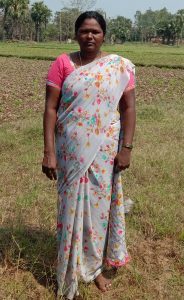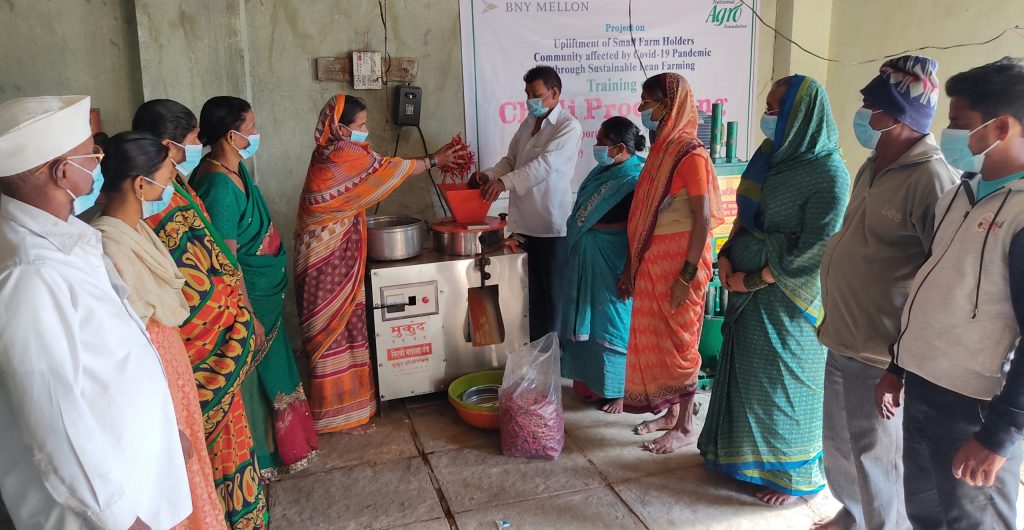 “Investing in women means investing in the people who invest in everyone else.”
“Investing in women means investing in the people who invest in everyone else.”
– Melinda Gates
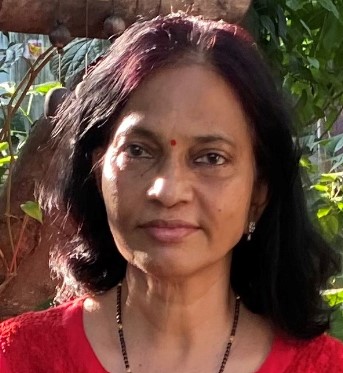
Women’s contribution to the economic development of any country is enormous. As India economically surges on the global stage, the extent of the contribution by Indian women, unfortunately, does not get the attention it deserves. We only need to look at local self-help groups and women’s co-operatives to understand the positive impact they have on the rural economy. Empowerment is the key to sustainability in rural development. The role of women in rural development is significant as they not only comprise half of the rural population but are also the primary stakeholders in poverty alleviation and in establishing nutritional security at the household level.
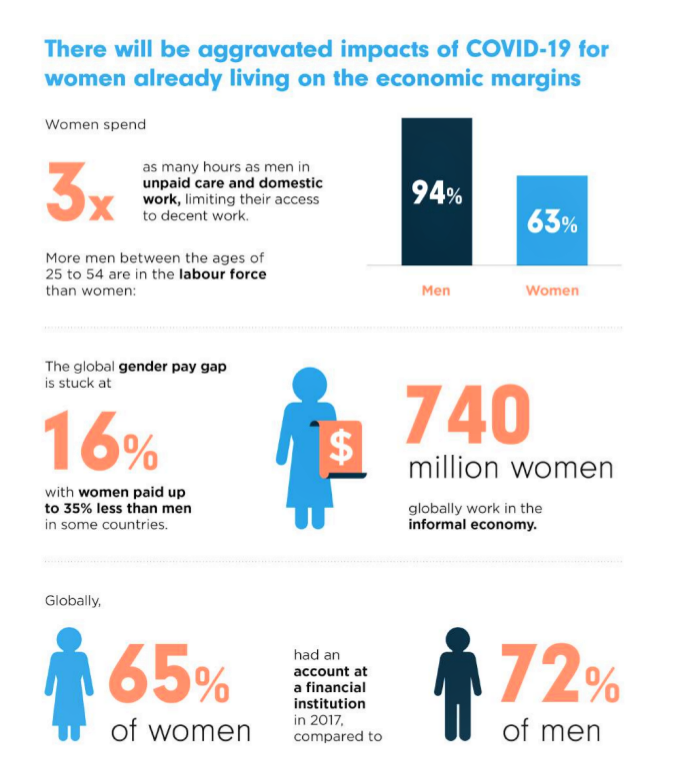
Gender parity becomes essential for the holistic growth of rural society and the economy. Similarly, large numbers of women in the industrial and corporate workforce today have been active drivers of economic growth. However, there remain concerns that the percentage of female labour participation in the workforce – a direct indicator of women empowerment – has gradually declined over the past three decades. The situation has only worsened during the pandemic.
The entrepreneurial spirit of rural women has long been critical to their community’s survival and sustainable socio-economic development. An entrepreneur maximises opportunities, comes up with innovative ideas and starts an enterprise in the market. Women are scientifically proven to be better than men at multi-tasking, stress management, calculated risk-taking, emotional intelligence, and profitable decision-making. Thus, the result of the entrepreneurial skill training of rural women can create an impact beyond measure.
As per a report published in 2021 by the International Federation of Red Cross and Red Crescent Societies (IFRC), in 82 per cent of countries surveyed, women were disproportionately impacted by the social and economic burdens that resulted from the pandemic, including loss of income and increased responsibilities for caring. The COVID-19 crisis kept 1.3 billion Indians inside their houses in an unprecedented lockdown to defeat the COVID-19. When millions of migrant workers had to walk back to their villages and were left with no source of income, women had to take up the responsibility of caring for children and sick relatives while earning to feed their families.
The entrepreneurial spirit of rural women has long been critical to their community’s survival and sustainable socio-economic development. An entrepreneur maximises opportunities, comes up with innovative ideas and starts an enterprise in the market. Women are scientifically proven to be better than men at multi-tasking, stress management, calculated risk-taking, emotional intelligence, and profitable decision-making. Thus, the result of the entrepreneurial skill training of rural women can create an impact beyond measure.
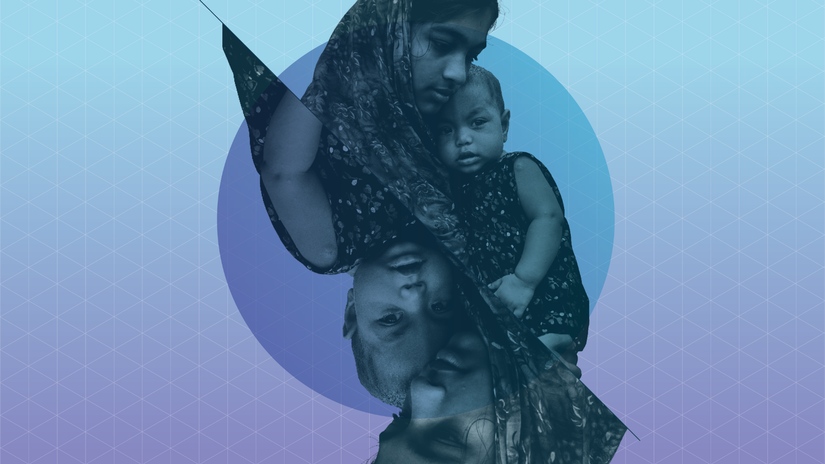
Our CSR Strategy
At BNY Mellon, philanthropy is more than a legacy or philosophy. Our carefully targeted CSR programmes ensure that each act of kindness produces a significant difference in the life of a deserving individual. We have hosted diverse programmes and interventions pan India to develop rural women entrepreneurs. The programmes are designed to overcome the key challenges faced by rural women entrepreneurs such as lack of capital, short of adequate skills, lack of resources, poor marketing and branding knowledge, lack of awareness on financial tools and lack of buoyancy or self-belief.
Through this skill-based training – Skill Development Training for Rural Women Entrepreneurs – we provided training to women on professional skills that enable them to join the skilled workforce and become proud owners of their very small-to-medium-size businesses. This allows the women financial independence and the ability to provide for their families, autonomy and a feeling of empowerment. These women are now connected with the world beyond their villages.
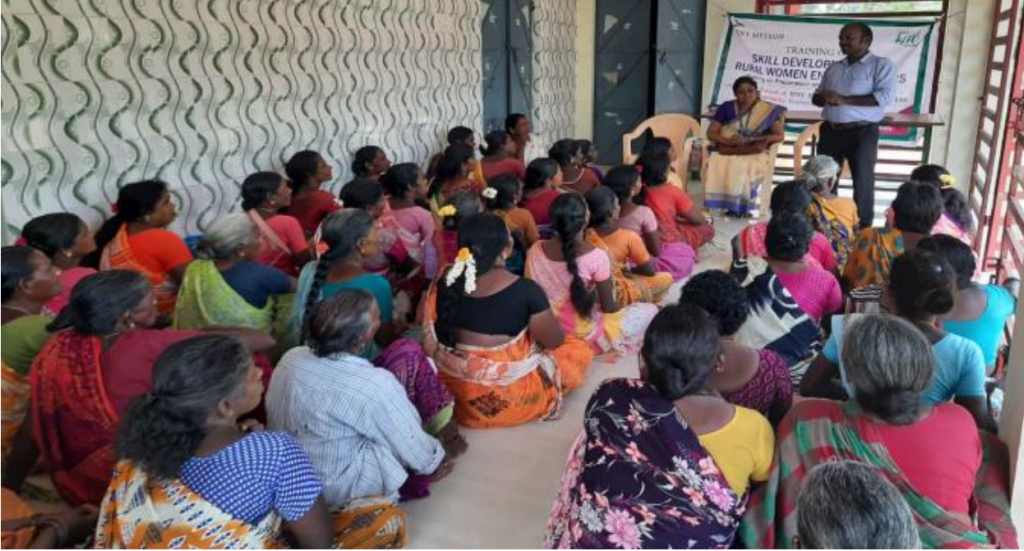
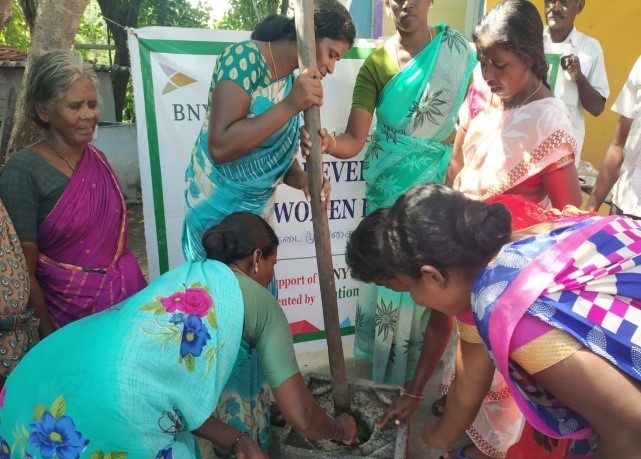
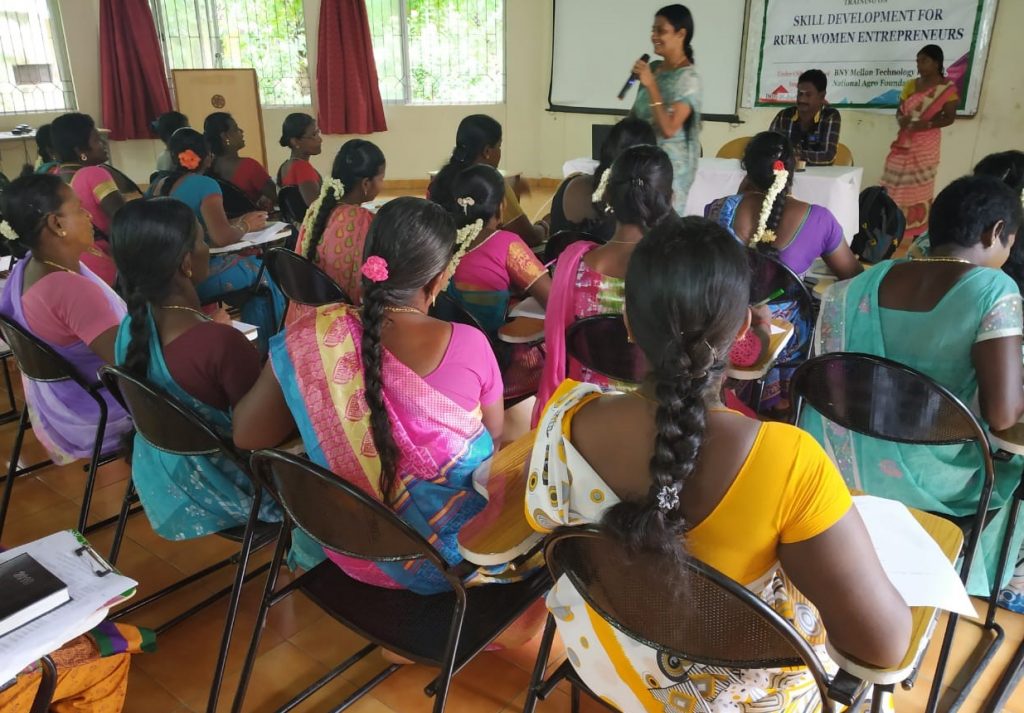
Keeping with this focus, in association with the National Agro Foundation, we have supported the ‘Skill Development Training for Rural Women Entrepreneurs’ programme since 2019. The initiative successfully trained and empowered 1392 women in rural India across Tamil Nadu, Maharashtra, Kerala, and Puducherry. Women that have benefitted from this initiative come from various economically underprivileged areas and hail from remote villages where they worked as agricultural labourers or as employees under the MNREGA (Mahatma Gandhi National Rural Employment Guarantee Act). Through this skill-based training – Skill Development Training for Rural Women Entrepreneurs – we provided training to women on professional skills that enable them to join the skilled workforce and become proud owners of their very small-to-medium-size businesses. This allows the women financial independence and the ability to provide for their families, autonomy and a feeling of empowerment. These women are now connected with the world beyond their villages.
Extensive Benefits from Azolla Cultivation
Kasturi
|
Along with National Agro Foundation, we identified and conducted over 600 training programmes across different skill sets like Lean Farming Technologies, Jute Bag Manufacturing, Bio-input Preparation, Nursery Management, Mushroom Cultivation, Poultry Farming, Tailoring, Food Safety Certification, etc. and trained women to master their respective fields.
Key Projects and Impact
Fifty economically underprivileged women from a remote village in Tamil Nadu who were further made vulnerable as they are destitute, physically challenged, and spinster women, were trained by National Agro Foundation between December 2019 and January 2020 on tailoring and jute bag making, etc. On completing the training programme, they started earning through orders on school bags, lunch bags, etc. In the wake of the virus, the women found a more sustainable model. Using their newly acquired tailoring skills, they began to produce safety masks, 20,000 per week and secured orders for masks from the Government of Tamil Nadu and a corporate agency. This helped them relieve lockdown-induced economic stress on their families.
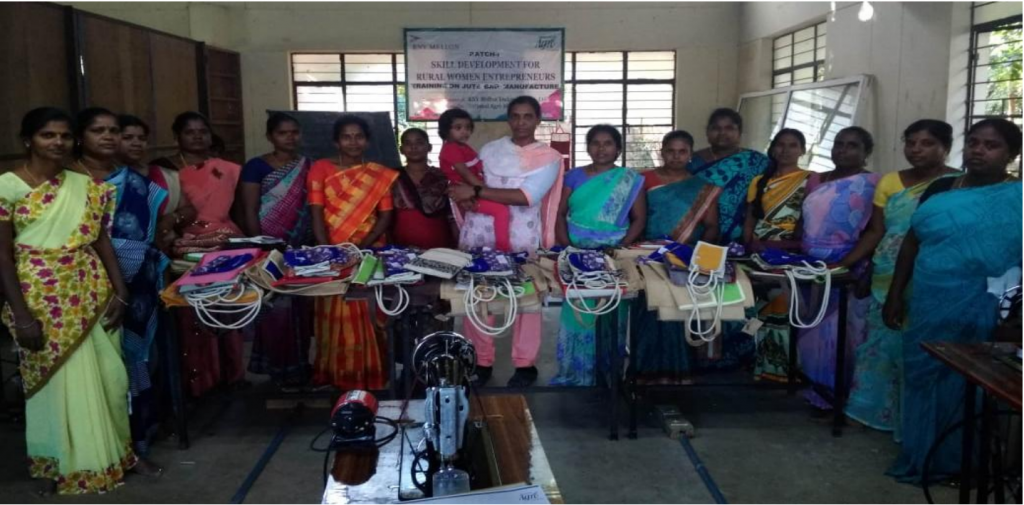
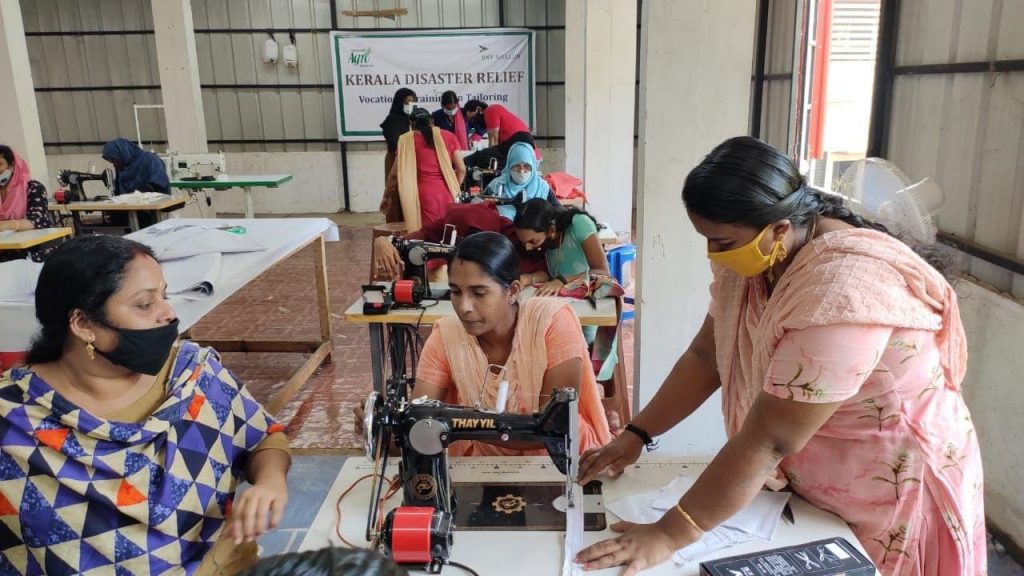 The training programme on tailoring at Kerala, as a part of BNYM-NAF monsoon floods relief, helped flood victims to recover from the trauma of heavy floods and gain vocational skills that helped them in creating additional income for the family, thus improving their overall socio-economic status.
The training programme on tailoring at Kerala, as a part of BNYM-NAF monsoon floods relief, helped flood victims to recover from the trauma of heavy floods and gain vocational skills that helped them in creating additional income for the family, thus improving their overall socio-economic status.
Tailored for Success
Sivasankari
|
When women succeed, the entire society benefits. It is time we tap into this talent pool with new aspirations and a commitment to empowering women. With equal rights, empowerment, and training, India’s women will become the agents of change as they possess the ability to lead our nation towards a more sustained socio-economic ecosystem.
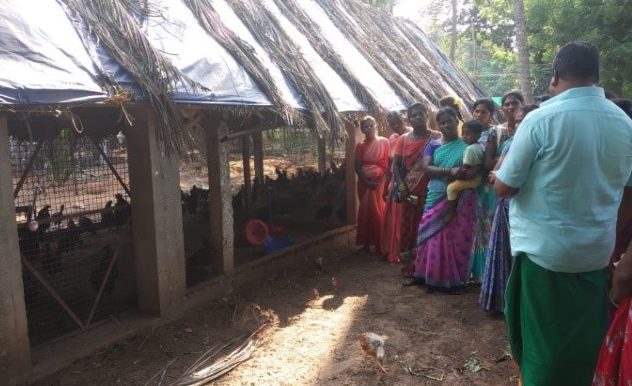 A few of our trainees established various agricultural units such as household poultry units, mushroom cultivation, organic inputs, bio-inputs, etc. and are supporting their family income through additional income from domestic sales.
A few of our trainees established various agricultural units such as household poultry units, mushroom cultivation, organic inputs, bio-inputs, etc. and are supporting their family income through additional income from domestic sales.
 We set up a Chilli Processing Unit at Ghorepatal Village in Pune District to benefit the farming community. We then trained five out of the twenty women volunteers to operate the unit.
We set up a Chilli Processing Unit at Ghorepatal Village in Pune District to benefit the farming community. We then trained five out of the twenty women volunteers to operate the unit.
Three out of 13 participants have bought their farm machinery through government support after learning the 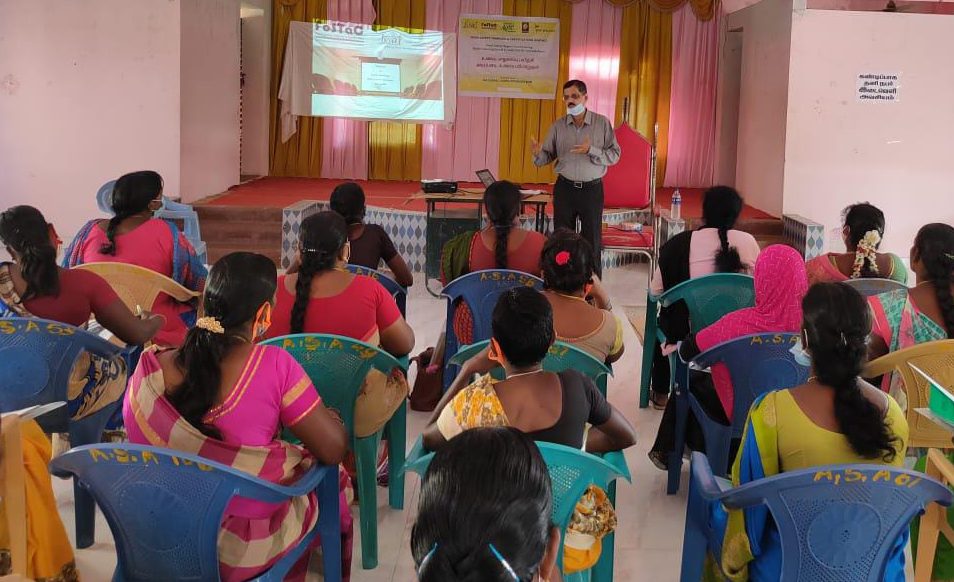 applications and financial means available through the training programme on farm machinery.
applications and financial means available through the training programme on farm machinery.
The women who underwent FoSTaC – a food safety training – were given a 2-year certificate upon successful completion to pursue their carrier in this field.
It is a humbling experience to witness the enthusiasm of these women as they take control and responsibility and refused to be defeated by the prevailing situation in the country. While the pandemic may have affected the whole world, the bitter reality is that it always affects certain sections of society disproportionately.
A Natural and Eco-friendly Approach to Farming
Dhatayani
|
Vision for the Future
 As rural women entrepreneurship is directly linked to Sustainable Development Goals (1) No Poverty, (4) Quality Education, (5) Gender Equality, (8) Decent Work and Economic Growth, and (10) Reduced Inequalities, it is essential to create more women entrepreneurs throughout the globe. And it is strategically more important for India to address the increasing unemployment rate, widening gender gap, and increasing digital divide, as all these are at the forefront of the solutions to the wicked social problems.
As rural women entrepreneurship is directly linked to Sustainable Development Goals (1) No Poverty, (4) Quality Education, (5) Gender Equality, (8) Decent Work and Economic Growth, and (10) Reduced Inequalities, it is essential to create more women entrepreneurs throughout the globe. And it is strategically more important for India to address the increasing unemployment rate, widening gender gap, and increasing digital divide, as all these are at the forefront of the solutions to the wicked social problems.
When women succeed, the entire society benefits. It is time we tap into this talent pool with new aspirations and a commitment to empowering women. With equal rights, empowerment, and training, India’s women will become the agents of change as they possess the ability to lead our nation towards a more sustained socio-economic ecosystem. We work with non-profit organisations and invest in initiatives to help others in need by concentrating on areas that fulfil the basic needs while also developing the workforce, thus making the community a better place to live.


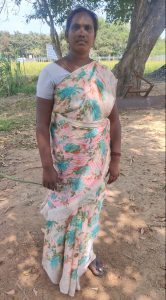 With BNY Mellon’s support, I was trained at National Agro Foundation. They gave me training on Lean Farming Technologies. As part of the training programme, I learnt about Azolla cultivation. I am now cultivating it at my home. I use it as feed for poultry and goats and as an input to the paddy crops. Usually, while planting paddy, we need to employ 5 to 6 people to weed out. But Azolla controlled the growth of weeds. We used to get about 1.5 litres of milk from our cows. After using Azolla along with the feed, we now get about 3 to 4 litres of milk. I also use it as feed to the chickens. I thank BNY Mellon for conducting this training programme.
With BNY Mellon’s support, I was trained at National Agro Foundation. They gave me training on Lean Farming Technologies. As part of the training programme, I learnt about Azolla cultivation. I am now cultivating it at my home. I use it as feed for poultry and goats and as an input to the paddy crops. Usually, while planting paddy, we need to employ 5 to 6 people to weed out. But Azolla controlled the growth of weeds. We used to get about 1.5 litres of milk from our cows. After using Azolla along with the feed, we now get about 3 to 4 litres of milk. I also use it as feed to the chickens. I thank BNY Mellon for conducting this training programme.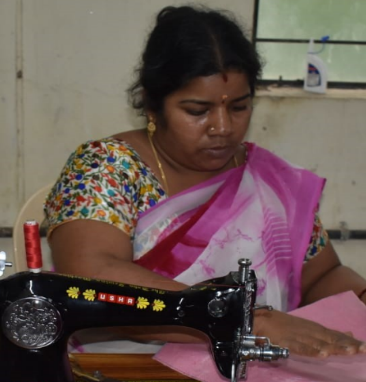 BNY Mellon and National Agro Foundation taught us to make jute bags. They taught us 11 models of jute bags. With our newly acquired skill, we have received a school order, a wedding order and other such orders that are keeping us busy as well as benefiting us. They also gave us sewing machines which are a great help to us in diversifying our work such as blouse stitching. We feel we are as good as the professional tailors. We are earning
BNY Mellon and National Agro Foundation taught us to make jute bags. They taught us 11 models of jute bags. With our newly acquired skill, we have received a school order, a wedding order and other such orders that are keeping us busy as well as benefiting us. They also gave us sewing machines which are a great help to us in diversifying our work such as blouse stitching. We feel we are as good as the professional tailors. We are earning